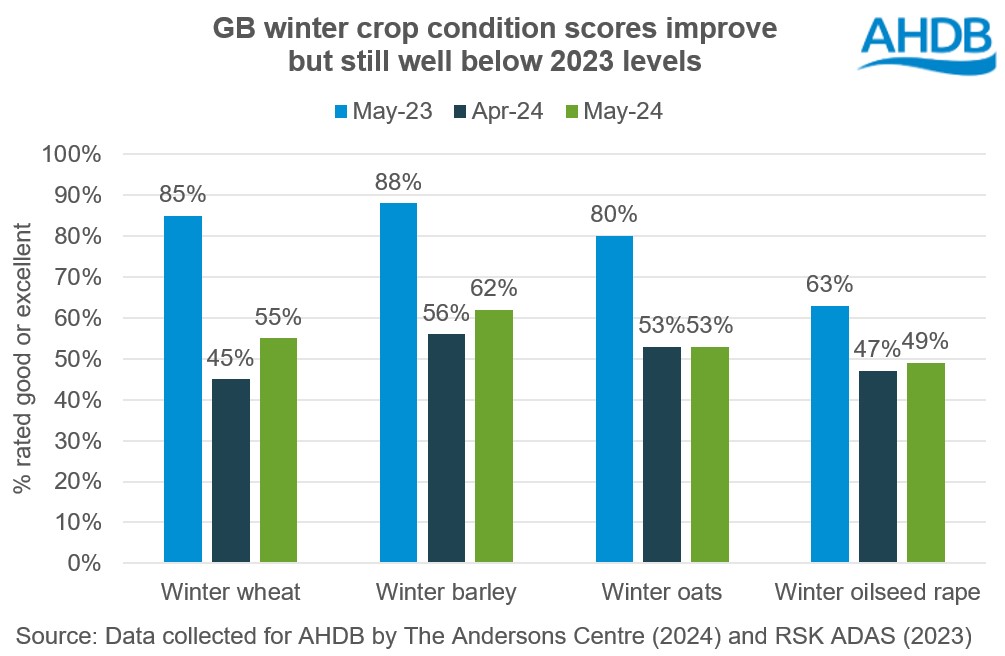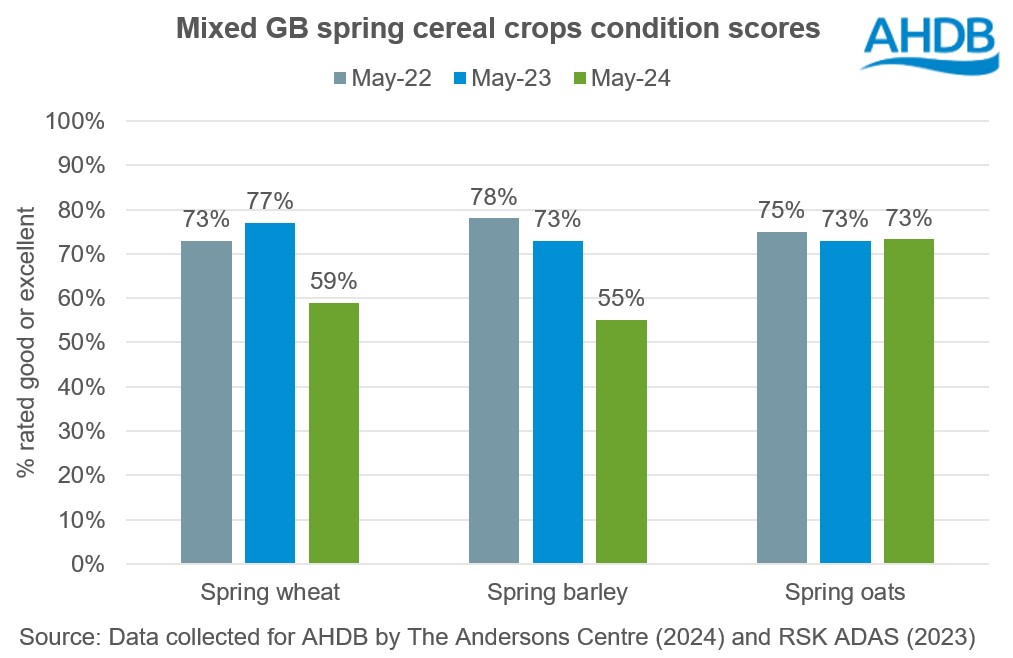Warmest May on record benefited UK crop growth: Grain market daily
Friday, 7 June 2024
Market commentary
- Nov-24 UK feed wheat futures lost another £2.05/t yesterday to settle at £212.20/t, while the May-25 contract lost £1.55/t to close at £219.70/t.
- Global wheat future prices continued to decline yesterday. The key factors were harvest pressure from the quicker than average start to the US winter wheat harvest and ongoing competition in export markets. A lack of new information about the Russian wheat crop, improving prospects elsewhere and selling by speculative traders were also factors.
- Nov-24 Paris rapeseed futures settled at €482.75/t yesterday, up €6.50/t from Wednesday’s close. Rapeseed prices followed Chicago soyabean futures higher.
- Chicago soyabean and maize futures rose following a change to tax rules in Brazil and buying by speculative traders (LSEG). The rule change could make Brazilian companies less competitive in export markets and shift some demand from Brazil to the US.
Warmest May on record benefited UK crop growth
Both winter and spring crops benefitted from kinder weather in May in the UK, shows the latest AHDB crop development report.
Released this morning, the AHDB crop report captures information on crop conditions and development up to Wednesday 5 June. The information was captured for AHDB by The Andersons Centre.
May 2024 was the warmest May on record back to 1884 for the UK (Met Office). While the warmer days supported crop development, nights were also warmer, which can have a negative impact on yields.
The first half of the month had average rainfall overall, with amounts increasing in the second half, especially in Northern England. This led to difficulties getting onto land to spray and some farmers are still behind; others skipped or simply missed certain applications. However, while rainfall overall was higher than usual in May, the light showers generally favoured crop growth.
Winter crops improve
Winter crop condition scores have generally improved from the end of April, with most crops now far stronger. However, the scores are still notably below the last couple of years. For example, 55% of GB winter wheat is rated as in good or excellent condition, up from 45% a month ago and 34% at the end of March, but still below last year’s 85%.

It’s also important to note the more challenging conditions in northern parts of England. As a result, some local crop condition ratings have not improved from last month.
Overall crops have grown well, and most winter crops are at the expected growth stages for the time of year despite their extremely poor start. While crops are leafy, it’s still unclear what this will mean for yields. The continued difficulties timing spray and nutrition applications also contribute to restricted yield potential compared to previous years.
Spring crop conditions encouraging after late start
After such a late start, it’s arguably unsurprising that spring cereal crops are behind the growth stages that might usually be seen. Despite this, these crops are growing rapidly into strong plants and generally look well. In particular, the condition scores for spring oats, which will likely represent the majority of the oat areas this year, are in line with last year’s levels.

Spring barley potential is encouraging overall. 55% of GB spring barley is rated as in a good or excellent condition, compared to 73% at the end of May 2023. Tillering is complete and though some crops on heavier soils in the Midlands are thin and behind, most others are catching up remarkably. In Scotland, the crop is looking stronger and healthier by the day and has largely caught up with the stage of development expected at this time of year.
Some regions did not manage to complete spring drilling, so the fallow area will be high this year.
A sunny June?
Overall, UK crop prospects are improved compared to last month, and even more starkly when compared to the situation at the end of March. However, potential still limited compared to ‘normal’ for most winter crops; the drilling delays may also have affected spring crop yield potential.
Sunshine through June and into early July is now important for crops to support yield potential, especially grain and pod fill for winter crops. Forecasts point to the unsettled conditions continuing for the next week at least.
Please note: this article was originally published without the following sentence: 'While the warmer days supported crop development, nights were also warmer, which can have a negative impact on yields'.
Sign up to receive the latest information from AHDB.
While AHDB seeks to ensure that the information contained on this webpage is accurate at the time of publication, no warranty is given in respect of the information and data provided. You are responsible for how you use the information. To the maximum extent permitted by law, AHDB accepts no liability for loss, damage or injury howsoever caused or suffered (including that caused by negligence) directly or indirectly in relation to the information or data provided in this publication.
All intellectual property rights in the information and data on this webpage belong to or are licensed by AHDB. You are authorised to use such information for your internal business purposes only and you must not provide this information to any other third parties, including further publication of the information, or for commercial gain in any way whatsoever without the prior written permission of AHDB for each third party disclosure, publication or commercial arrangement. For more information, please see our Terms of Use and Privacy Notice or contact the Director of Corporate Affairs at info@ahdb.org.uk © Agriculture and Horticulture Development Board. All rights reserved.


